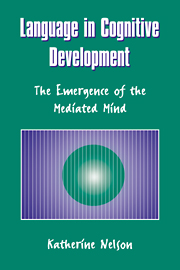Preface
Published online by Cambridge University Press: 05 June 2012
Summary
This book is about the role that language plays in early human development, from the period before the infant has access to the meaning system embedded in language to the point of relatively full access to linguistic messages conveyed orally. This early period (roughly 1 to 5 years of age) sets the stage for the acquisition of cultural knowledge systems and for entering into the literate cultural world as a full participant in all its technologies. My emphasis is not on the ways in which culture influences and forms children, but rather on the ways in which the child comes to participate in cultural and social activities, and the cognitive consequences of that participation at different levels and through different modes of representation. The focus of my story is the child in a social-cultural world, learning and using language for her own purposes, becoming a more skilled and better informed participant in the activities of that world.
The main theoretical ideas about cognitive development have been proposed and articulated by giants such as Baldwin, Dewey, Piaget, and Vygotsky; their intellectual descendents are alive and well, currently making substantial contributions to the field. Other writers have made connections between developmental psychology and contemporary linguistic, philosophical, and cognitive science theories. Yet what has failed to emerge, and what seems more remote now than ever, is a strong central theoretical viewpoint of what human development is and how it should be studied in its infancy and childhood phases.
Information
- Type
- Chapter
- Information
- Language in Cognitive DevelopmentThe Emergence of the Mediated Mind, pp. ix - xivPublisher: Cambridge University PressPrint publication year: 1996
